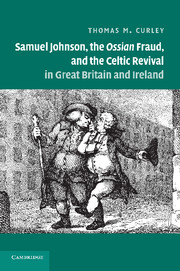Book contents
- Frontmatter
- Contents
- Prefatory acknowledgments
- 1 An introductory survey of scholarship on Ossian: why literary truth matters
- 2 James Macpherson's violation of literary truth
- 3 Johnson on truth, frauds, and folklore: in the company of Thomas Percy
- 4 Searching for truth in the Highlands: Macpherson throws down the gauntlet
- 5 Charles O'Conor and the Celtic Revival in Ireland
- 6 Johnson and the Irish: more opposition to Ossian
- 7 Johnson's last word on Ossian with William Shaw: a finale to controversy
- Appendix A A Reply to Mr. Clark's Answer
- Notes
- Bibliography
- Index
Appendix A - A Reply to Mr. Clark's Answer
Published online by Cambridge University Press: 30 July 2009
- Frontmatter
- Contents
- Prefatory acknowledgments
- 1 An introductory survey of scholarship on Ossian: why literary truth matters
- 2 James Macpherson's violation of literary truth
- 3 Johnson on truth, frauds, and folklore: in the company of Thomas Percy
- 4 Searching for truth in the Highlands: Macpherson throws down the gauntlet
- 5 Charles O'Conor and the Celtic Revival in Ireland
- 6 Johnson and the Irish: more opposition to Ossian
- 7 Johnson's last word on Ossian with William Shaw: a finale to controversy
- Appendix A A Reply to Mr. Clark's Answer
- Notes
- Bibliography
- Index
Summary
INTRODUCTION
William Shaw on 7 July 1781 published AN ENQUIRY INTO THE AUTHENTICITY OF THE Poems ascribed to OSSIAN (London: J. Murray, 1781) in 87 octavo pages priced at a shilling and a half. For all its flaws, this pamphlet was one of the most effective eighteenth-century indictments of the literary hoax perpetrated by James Macpherson and his imitators in pseudo-Gaelic versifying. It provoked John Clark (d. 1807), another fabricator of “ancient” Scottish Gaelic verse, to retaliate with An ANSWER to Mr Shaw's Inquiry into the Authenticity of the POEMS ascribed to OSSIAN (Edinburgh and London: C. Elliot, T. Longman and T. Cadell, 1781) in 76 octavo pages priced at one shilling. The counter-attack of Shaw and Johnson surfaced on 3 April 1782 with the printing of the “Second EDITION Corrected” of AN ENQUIRY INTO THE AUTHENTICITY OF THE POEMS ascribed to OSSIAN. WITH A Reply to Mr. CLARK's Answer (London: J. Murray, 1782), priced again at a shilling and a half. Except for the deletion of a final anecdotal paragraph, the only consequential change in the reissued Enquiry (octavo pages 1–48) was the inclusion of the twenty-nine page Reply (octavo pages 51–80), followed by five letters (octavo pages 81–8) concerning Thomas Percy's part in the Ossian controversy.
A transcription of the Reply itself appears below, with annotations to elucidate meaning and Johnsonian contributions to the text. Shaw penned a rough draft, which the publisher sent to Johnson for extensive polishing.
- Type
- Chapter
- Information
- Samuel Johnson, the Ossian Fraud, and the Celtic Revival in Great Britain and Ireland , pp. 231 - 251Publisher: Cambridge University PressPrint publication year: 2009



